Irrigation Counteracts Global Warming

Irrigation can counteract global warming on a local scale, a new study shows, but increasing demand for water is likely to curb that influence in the future, scientists predict.
Scientists from the Lawrence Livermore National Laboratory in California showed that there was an irrigation-induced cooling in agricultural areas, based on observations of temperature and irrigation trends throughout California.
In highly irrigated regions of the San Joaquin Valley, daytime temperatures have cooled by 1.8 to 3.2 degrees Celsius since the introduction of irrigation in 1887, as compared to low-irrigated areas.
"This is not a model result, but something very clearly evident in the data," said Celine Bonfils of Livermore Lab. "We also looked at other major irrigated regions in the world and saw a very similar pattern."
The cooling effect was noted in other areas where irrigation development has been rapid, including Thailand, the Aral Sea Basin in Central Asia and Nebraska.
Irrigation cools the surface of the Earth by increasing the amount of energy used to evaporate water instead of heating the land.
The findings of the study, detailed in the Aug. 13 issue of the Proceedings of the National Academy of Sciences, also contradict earlier work that linked rising nighttime summer temperatures to irrigation in California's Central Valley.
Sign up for the Live Science daily newsletter now
Get the world’s most fascinating discoveries delivered straight to your inbox.
"Our results show that the expansion of irrigation has almost no effect on minimum temperatures and that irrigation cannot be blamed for this rapid warming," Bonfils said.
The study also showed that the cooling effect had recently slowed down in California as irrigation development also flagged.
"There was no clear effect of irrigation on temperatures over the 1980 to 2000 period when there was no net growth of irrigation," said study team member David Lobell, also of Livermore Lab.
The cooling influence of irrigation is likely to continue to decline as irrigation expansion has been decreasing in the United States and the growth of irrigation elsewhere in the world also has slowed down.
"Throughout the major irrigated regions of the world, the cooling influence of irrigation on daytime maximum temperatures will be much smaller in the next 50 years than in the past century and will likely not continue to curb the effects of global warming anymore," Bonfils said.
- Video: Goldilocks and the Greenhouse
- Global Warming: How Do Scientists Know They're Not Wrong?
- What's Your Environmental Footprint?

Andrea Thompson is an associate editor at Scientific American, where she covers sustainability, energy and the environment. Prior to that, she was a senior writer covering climate science at Climate Central and a reporter and editor at Live Science, where she primarily covered Earth science and the environment. She holds a graduate degree in science health and environmental reporting from New York University, as well as a bachelor of science and and masters of science in atmospheric chemistry from the Georgia Institute of Technology.










